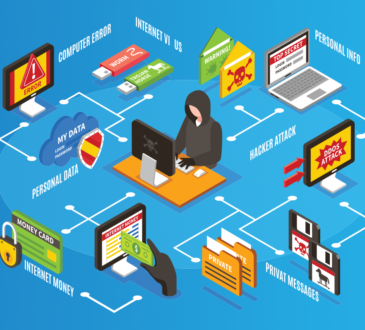
It is believed that digital security is designed to reduce data breaches and raise a secure environment for hardware failures. This protects the information from hacker attacks, which can make your data inaccessible. However, to maintain digital security, companies should conduct regular cybersecurity audits and implement a recommended cybersecurity solution or seek the advice of a digital security expert. However, with the rise of cyber threats and internal threats to employees, which now account for 70.7% of data breaches in organizations, digital security has become a subject for everyone.
Definition of Digital Security
Digital security is the protection of someone’s digital personality because it identifies the physical identity of the Internet you use or the Internet services you use. Digital security includes the tools you use to protect your identity, assets, and technology in the online and mobile worlds. Imagine just a digital personality as a human body. We use several methods (tools) to protect the body.
We eat and live healthily and do not harm ourselves. The same goes for our digital personality. Several cyber-attacks happen every day, and everyone can suffer from cyber theft, hacking, or crime. Leading international brands are hacked by fake information posted on their websites and are often targeted at small businesses and innovative start-ups in all industries, as most do not have a digital security system.
Types of Digital Security Threats
There are four categories of cyber threats. These are:
Ransomware
As the name suggests, ransomware attacks hold back the ransom system, preventing users from accessing the system or data if the ransom is not paid. Malicious clips usually block access to files or encryption so that users cannot access them.
Malware
This term encompasses a variety of programs, including viruses and worms, Trojans, spyware, adware, software, and more.
Social Engineering
A social engineering attack uses psychological therapy to trick a user into making security mistakes. Most attacks on social technology are based on greed or create situations in which their victims react with fear.
Phishing
It is designed to deceive victims into sending sensitive data, which can then be used to steal personal documents, transfer money, or carry out major post-step attacks.
Why Is Digital Crime on The Rise?
It is mainly driven by the increased publication of mandates online through cloud services. But that is not the only goal. Electrical networks and other industrial equipment that manages the infrastructure can be disrupted or destroyed. Social technology remains the easiest network, and solutions, the web, and spyware are the easiest forms of access. Another common history of attacks is a third-party and fourth-party service provider that processes your data and has poor cybersecurity practices, which makes vendor risk management and third-party risk management even more important.
According to a survey, average spending by cybercrime organizations rose $ 1.45 million last year to 13.5 million dollars, and the average number of data breaches increased by 11.3%. Otheraspectspaying to the evolution of digital crime:
- The ability of cybercriminals to attack targets beyond their authority makes it difficult to enforce the law
- Lower profitability and easy business on the dark web
- Frequency of mobile phones and the Internet of Things.
What Are The Consequences Of Digital Crime?
All companies, no matter how large, must ensure that all employees understand the threat of cyber and digital security and how to reduce it. This does not mean that damage to reputation due to even a minor data breach or other security incident is not significant. However, over time, consumers expect increasingly sophisticated digital security measures. All the same, economic costs – theft of intellectual property, company information, business interruption, and repair of damaged systems. All the same, the misunderstanding and lack of knowledge lead to a lack of responsibility and vigilance on the part of employees for digital security, which can lead to devastating consequences such as large data leaks.
- Invest in tools that limit data loss, monitor the risks of third parties and independent service providers, and constantly check for reliable data leaks and leaks.
- Use cost-cutting technology, such as sending automated vendor assessment questionnaires as part of an overall network security assessment plan
The Importance of Training
Enlightening the public about cybersecurity and informing people about the associated risks can reduce this impact. By helping the public understand how their activities can play a role in cybersecurity, for example by using unresolved issues involving human error and solving real-time training through real-time training, employees can understand the problem and feel part of it and take action actively to prevent them. Sensitive data such as names, personal addresses, and bank details may be damaged. This not only jeopardizes the company’s investigation in the information office, as it ignores the obligation to protect customer data but does great damage to their reputation.
Becoming a Digital Security Expert
Once your interest in digital security professionals begins, you need to take every opportunity to become a digital security expert. There are many ways to learn about digital security, such as books, websites, articles, and other useful resources. If you are a person who has the opportunity to attend a real course, it would be a good opportunity to enroll in a digital security course at any prominent university.
However, if you are an expert or someone with very limited flexibility but the energy to create digital security, the best option would be to follow the cybersecurity certification offered through the e-learning platform. Many of these courses are run at your own pace, and above all, you will achieve a degree that is recognized worldwide.
Duties of a Digital Security Expert
They constantly monitor threats and observe the organization’s network for security breaches. Digital security experts also plan incidents and make contingency plans that the company will come up under the event of a successful attack. As cyber attackers are constantly using new tools and methods, they must monitor the powerful weapons available for protection. The right user with the right access can undermine even the most technical and secure systems.





